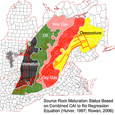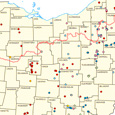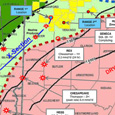WVU experts offer commentary on EPA’s landmark fracking study
Tuesday, June 9, 2015
West Virginia University experts say that the newly published findings from the Environmental Protection Agency’s report on hydraulic fracturing’s effect on drinking water confirm that proper well management is essential to the safety of the water supply.
Brian Anderson, director of WVU’s Energy Institute and the GE Plastics Material Engineering Professor of Chemical Engineering, said the EPA’s study highlights how important many of the research efforts at WVU are to balancing energy production and use with environmental stewardship.
“The work ongoing across the university is leading the way by both informing the West Virginia Department of Environmental Protection, the EPA and the public with data on the potential environmental impacts of natural gas development and to help in the continued development of energy technologies that minimize its environmental footprint,” he said.
About the study
The study, which began in 2010 at the behest of the United States Congress, is a comprehensive examination of the impact of hydraulic fracture stimulation, known as fracking, on drinking water.
The draft report, released last week, concluded that fracking has not had a significant impact on water supplies, but remains cautious of the risks associated with this type of drilling.
The shale-gas industry has seen a recent boom in the U.S. and is being heralded as a “game changer” for energy markets. Yet, despite the apparent benefits of fracking – the use of pressurized water, sand and chemicals to extract natural gas from shale rock formations deep underground – there is heated public debate about its health and environmental effects.
Paul Ziemkiewicz, director of the West Virginia Water Research Institute, specializes in issues surrounding the use and disposal of water in drilling for natural gas in the Marcellus Shale region.
He said the EPA study confirmed that brines from shale gas development are toxic. They contain organic, inorganic and radioactive constituents in levels above those that would permit environmental release. However, the EPA study also confirmed that, if handled properly, these wastes posed little threat to drinking water.
“Problems occur when poor handling and storage result in accidental release,” Ziemkiewicz said. “Other exposure pathways include compromised well integrity and illegal discharge.”
All energy has inherent risks
Timothy Carr, WVU’s Marshall Miller professor of Geology, teaches shale-gas and oil short courses internationally and works with the U.S. Department of State to assist countries in developing the expertise to establish and regulate unconventional resources. He is also principal investigator for a WVU research project that will create the first-ever laboratory for the long-term study of shale-gas resources that looks at the full life cycle of a well – from drilling to completion to production.
He said that production or use of energy – any form of energy – has inherent risks.
“The EPA study lists a number of potential impacts, all of which are well known, but occur rarely and are well regulated in West Virginia,” Carr said. “The potential mechanisms identified include both routine activities and accidents that could result in impacts to surface or ground water.”
He emphasized that the EPA did not find any evidence that these mechanisms have led to any widespread, systemic impacts on drinking water resources in the United States.
“The bottom line is that hydraulic fracturing, when done to industry and regulatory standards, does not impact drinking water,” Carr said. “The goal should be for industry and regulators to commit to continuous improvement in a host of technologies to ensure the continued safe and environmental responsible development of West Virginia’s natural gas and liquids resources.”
Anderson, Ziemkiewicz and Carr are available to offer commentary to the media. Anderson can be reached at 304.293.6631 or Brian.Anderson@mail.wvu.edu, Carr at 785.550.8302 or Tim.Carr@mail.wvu.edu and Ziemkiewicz at 304.293.6958 or pziemkie@wvu.edu.
West Virginia University experts can provide commentary, insights and opinions on various news topics. Search for an expert by name, title, area of expertise or college/school/department in the Experts Database at WVU Today.




